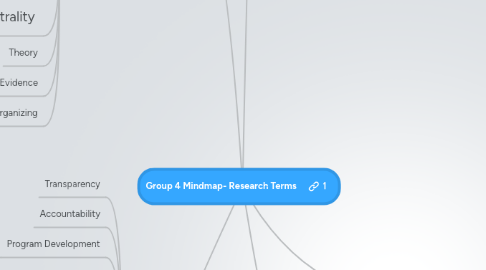
1. Scientific Research
1.1. Generalizability
1.2. Quantitative
1.3. Standardization of methods
1.3.1. Integration
1.4. Replicable
1.4.1. Tested and proven theories
1.4.1.1. Generate theories
1.5. Objective raw data
1.5.1. turned into statistics/usable information
1.6. Common measures of key constructs
1.6.1. Theoretical Constructs
1.7. Homogeneity
1.8. Quality (Supply) Utility (Demand)
1.8.1. data sharing
1.9. Cumulative Knowledge
1.10. Ethical Standards
1.11. Non-linear and unpredictable
1.12. Empirical methods
1.13. Controlled Group
1.14. Neutrality
1.15. Theory
1.16. Evidence
1.17. Organizing
2. Qualitative Research
2.1. Representational generalization
2.2. Descriptive
2.3. Relevance
2.3.1. Inferential Generalization
2.3.2. Theoretical Generalization
2.4. Subjective data
2.4.1. Field notes
2.4.2. Journaling
2.4.3. Documents
2.4.4. Transcriptions
2.4.5. Interviews
2.4.5.1. Personal Blogs/Journal entries
2.4.5.2. Open Ended
2.4.6. Artifacts
2.5. Claims
2.5.1. Evidence and Theory
2.5.2. Connections to interpreted data
2.5.3. Validation
2.6. Interpretations and constructions
2.7. Thought-provoking feedback
2.7.1. Review and implantation
2.8. Innovation of methods
2.9. Heterogeneity
2.10. Open and Supple (Flexible) in approach
2.11. Continuous construction and maintenance
2.12. Case Studies
2.12.1. Credibility and quality of evidence
2.12.2. Explanatory Case Studies
2.12.3. Intrinsic Case Studies
2.12.4. Descriptive Case Studies
2.13. Interviews
2.13.1. Field Interviews
2.14. Focus Groups Discussions
2.14.1. Observations
2.15. Representational Generalization
2.16. Prescriptive
2.17. Discipline
2.18. Communities
2.19. Philosophies
2.20. Self Correction
3. Applicable to Both
3.1. Transparency
3.2. Accountability
3.3. Program Development
3.3.1. Sub-fields of Education Research
3.4. Confidentiality
3.5. Context
3.6. Theoretical constructs
3.7. Out Comes
3.8. Collaboration
3.8.1. Peer Reivew
3.8.1.1. Blinded Copies
3.9. Validity
3.9.1. Notable and trustworthy sources
3.9.2. Heuristic approach
3.9.3. Reliability
3.9.4. Rigor
3.10. Knowledge building/knowledge accumulation
3.11. Systematic procedures
3.11.1. Standardization
3.12. Methodological
3.13. Abstract
3.13.1. Information retrieval process
3.13.2. Standardized abstracts
3.14. Meta-analysis
3.15. Educational Inquiry
3.16. Contribution
3.17. Open Access
3.17.1. Data Sharing
3.17.1.1. Knowledge accumulation
3.17.2. Evidence
3.17.3. Secondary Research
3.18. Standards of Evidence
4. standards of evidence
4.1. Research Practice
5. Quantitative Research
5.1. Scientific Research
5.2. Numbers/Generally Percentages
5.3. Experiments
5.4. Closed Questions
5.5. Validating hypothesis with statistics
5.6. Objective
5.7. Analysis of data
5.8. Development of instruments for Measurements
5.9. Theories
5.9.1. Theoretical constructs
5.10. Survey
5.10.1. usually marked with yes or no
